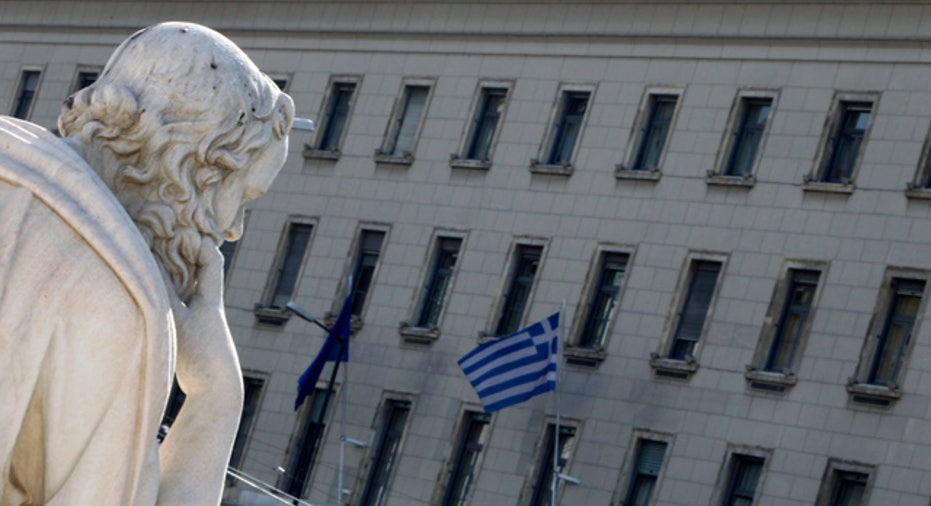Another Day Another Greek Austerity Deal

An agreement announced Thursday by Greek politicians for newer and harsher austerity measures that likely paves the way for yet another bailout for the debt-addled country raises two immediate questions.
In no particular order they are: is this newest package of spending cuts enough to right Greece’s teetering finances, and is this latest bailout enough to permanently stave off a messy default.
The answer to both questions is probably not.
“Greece’s economy is falling off a cliff. This does nothing to fix that,” said Peter Tchir, with TF Market Advisors in Connecticut.
At best, the deal provides temporary relief for those who fear a default by Greece would force it out of the 17-member eurozone and threaten the stability of the single currency euro, ultimately leading to an economic catastrophe for all of Europe.
(Although many analysts believe those fears are overblown.)
[pullquote]
U.S. markets were cautiously optimistic toward the announcement, with all three major indexes mildly higher in late trading.
Greek leaders needed to come up with something that would satisfy the so-called European troika – the European Union, the European Central Bank, and the International Monetary Fund – ahead of a March 20 deadline when billions of euros in Greek debt come due.
European leaders threatened to withhold a 130 billion euro ($172 billion) bailout unless Greece politicians negotiated yet another package of austerity measures in conjunction with an agreement by its debt holders to accept significant losses on their investments.
Presumably those rescue funds will now be released and Greece will not be forced to default on its debt next month.
But already there has been fallout in Greece as an influential politician has reportedly resigned in protest of the latest cuts. Bloomberg News reported that Greek Deputy Labor and Social Security Minister Yiannis Koutsoukos resigned his cabinet position.
The deal calls for steep wage cuts and large-scale layoffs to public employees. A sticking point in recent days was deep cuts proposed to pensions for Greek public employees. Those hurdles were apparently overcome to the satisfaction of Greek politicians but not necessarily Greek citizens. At the same time, Greece is about to drop its minimum wage from 750 euros to 600 a month.
All of these latest cuts come on top of two years of similar cutbacks and tax increases imposed on an increasingly agitated Greek populous.
The response to Thursday’s announcement was swift from Greece’s two major labor unions, which called a 48-hour strike for Friday and Saturday in solidarity against the austerity package.
“The painful measures that create misery for the youth, the unemployed and pensioners do not leave us much room,” Ilias Iliopoulos, secretary general of the ADEDY union, told Reuters. “We won’t accept them. There will be a social uprising.”
Two earlier bailouts -- the first in May 2010 and another in October -- have done little to slow Greece’s descent into recession. In November, the country’s unemployment rate stood at nearly 21%.
Skeptics of the long-running European bailout strategy say it misses a central point regarding Greece.
“Greece is insolvent,” Mesirow Financial’s Adolfo Laurenti said in an interview on the FOX Business Network. Given that circumstance, the bailout money once again being earmarked for Greece is widely viewed as essentially being poured down a drain.
Critics of the bailouts say Europe is still responding to Greece’s debt crisis as if it’s a liquidity issue.
In late 2008, the world’s central banks loosened fiscal policy in an effort to increase global liquidity and get money moving through the system again. Throwing money at the problem worked because the global economy wasn’t broke (out of funds), it was just frozen and needed help to thaw out.
If Greece’s problem was one of liquidity the two earlier bailouts might have helped shore up the country’s finances and gotten its economy back on more stable ground. But that hasn’t been the case.
Greece by most accounts has no money to pay its debts and its economic growth prospects are such that it won’t have any money for the foreseeable future. Consequently, giving it bailout money to pay its debts is nothing more than a temporary Band-Aid.



















